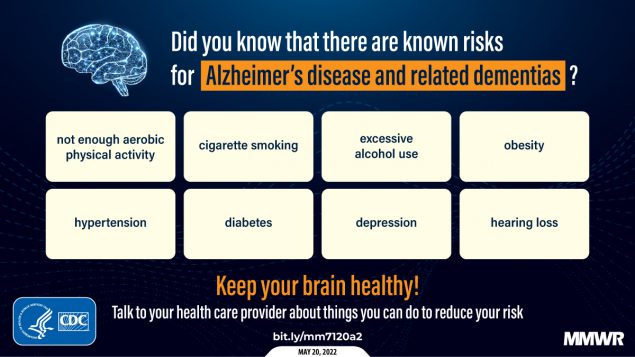Dementia Risk Reduction
A recent study revealed that nearly half of adults aged 40 years and older think they will likely develop dementia, such as Alzheimer’s disease.
The truth is dementia is not a normal or inevitable part of typical brain aging. It is also important to remember that as we get older, it is common to experience some cognitive decline with typical brain aging, such as subtle changes in memory, thinking, and reasoning. For example, you might not immediately remember where you left your car keys, but you can find them when retracing your steps, or you can’t think of the name of a person you just met; however, you remember meeting them. These subtle changes can be frustrating and should not be bad enough to affect your daily life.
Modifiable risk factors are the lifestyle and behaviors that can reduce or increase a person’s chances of developing a disease. For example, there are modifiable risk factors that could reduce your risk of Alzheimer’s disease and related dementias (ADRD), slow its progression, or increase your risk of ADRD. Most modifiable risk factors for ADRD are related to cardiovascular disease and other chronic health conditions. They include hypertension, not getting enough physical exercise, obesity, diabetes, depression, smoking, hearing loss, and binge drinking. Maintaining a healthy lifestyle and managing related chronic conditions is good for your overall physical health, facilitates and improves brain health, and may help decrease the risk of dementia or slow its progression.
A new CDC study examined how common these eight risk factors (hypertension, not getting enough physical exercise, obesity, diabetes, depression, smoking, hearing loss, and binge drinking) were among adults 45 years and older: 2
- Nearly 50% had high blood pressure or did not meet the aerobic physical activity guideline.
- Adults with cognitive decline were more likely to report at least 4 factors (34%) than those without cognitive decline (13%).
- 34% of adults who reported cognitive decline—worsening confusion or memory loss in the previous year—had at least 4 risk factors compared with 13.1% of those without cognitive decline.
- 9% of adults with no risk factors reported cognitive decline while 25% of those with at least 4 risk factors reported cognitive decline.
- Several modifiable risk factors were more common among African American, Hispanic, and American Indian or Alaska Native populations than other races and ethnicities.
Older African Americans have twice the incidence and prevalence of ADRD and higher burdens of chronic disease, like hypertension, than non-Hispanic White Americans.
Ways to Improve Your Brain Health
There is encouraging scientific news despite these risk factors: nearly 40% of all ADRD may be prevented or delayed.4 Since ADRD takes years to develop, there are opportunities to develop and maintain healthy lifestyle habits that could reduce your risk of ADRD or slow its progression. It is never too late to break old habits and start new ones.
This healthy lifestyle habits list consists of some things you can do and some things you should try to limit or avoid.
Things You Can Do:
- Get Active and Maintain a Healthy Weight—Regular physical activity is important for good health and combined with a healthy diet can lead to a healthy weight.
- Manage Blood Sugar—Learn how to manage your blood sugar if you have diabetes.
- Prevent and Manage High Blood Pressure—Tens of millions of adults in the United States have high blood pressure, and many do not have it under control. Learn the facts.
- Prevent and Correct Hearing Loss—Make sure to talk to a hearing care professional to treat and manage hearing loss.
- Find Support—Depression is not just having “the blues” or the emotions we feel when grieving the loss of a loved one. It is a medical condition that can be treatable.
Things You Should Try to Limit or Avoid:
- Binge Drinking—If you drink, do so in moderation. Learn about alcohol use and your health.
- Smoking—Quitting smoking improves your health and reduces your risk of heart disease, cancer, lung disease, and other smoking-related illnesses.

